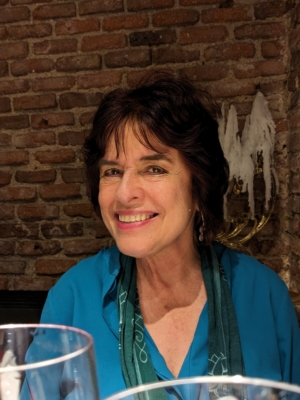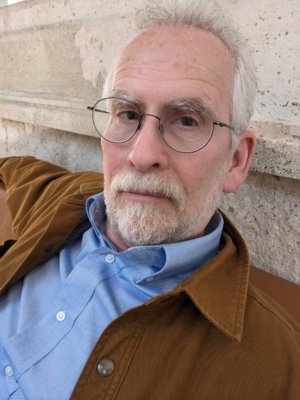I Don’t Know If You Can Hear the River
It seems to be dragging its freight
like an enormous beast.
On Monday at dawn,
two children saw a body
floating in the current,
limp, like a rag doll.
I told them that in rivers
there are no corpses,
that this was just gossip.
Yesterday the children came back,
saying they’d seen another body, downstream
floating among some ferns.
I didn’t answer back
because I know they throw bodies
into La Miel, our river:
bodies of prostitutes, of the old puppeteer,
of that young man who wore earrings…
nobody has counted those bodies.
My father—this was years ago—
was walking by the riverbank.
Someone saw him struggling,
heard some shots,
then a splash in the water…
and he didn’t come home.
My father, who slept little
and made the sun rise early,
who challenged the devil himself
and preached to god,
who shared his lunch with the cats,
the doves, and the dogs,
who called out the one they’d named “Panther,”
made him turn pale and flee into the bushes….
my father, that stubborn man, never returned home.
Maybe you notice that smell in his room
of sheets in storage, of moldy books.
That window he’d open to feel the sunlight
and listen to the cicadas
has been closed for years.
What’d happened to his remains?
Perhaps his bones got trapped among the stones
or the waters of La Miel carried them away
down to the river it joins:
Magdalena, that other river,
where they throw the dead.
And to think at its birthplace
our river used to smell of honey.
Now it’s a cemetery.
And to think “Magdalena”
is what they call a woman
who never stops crying.
No sé si escuchas el río
Parece que arrastra kilos
como de animal enorme.
El lunes al madrugar,
dos niños vieron un cuerpo
como un muñeco de trapo
desgonzado, en la corriente.
Yo les dije que, en los ríos
no hay cadáveres,
que eso eran habladurías.
Ayer volvieron los niños,
dizque vieron otro cuerpo, río abajo
flotando entre unos helechos.
Yo no les contesté nada,
porque sé que tiran cuerpos
a nuestro río La Miel:
cuerpos de unas prostitutas,
del viejo titiritero,
de un joven que usaba aretes…
nadie ha contado esos cuerpos.
Mi padre, de eso hace años,
iba andando por la orilla,
lo vieron forcejear,
escucharon unos tiros,
luego el splash en el agua…
y a casa no regresó.
Mi padre, que dormía poco
y hacía al sol madrugar,
que retaba al propio diablo
y sermoneaba a dios,
que compartía su almuerzo con los gatos,
las palomas y los perros,
que al que llamaban “pantera”
lo hizo palidecer y huir entre los matojos…
mi padre, ese testarudo, nunca regresó a la casa.
Quizás sientes en su cuarto ese olor
como a sábanas guardadas, a libros enmohecidos
y esa ventana que abría para recibir el sol
y escuchar a las chicharras
hace años que no la abren.
¿Qué habrá sido de sus restos?
Tal vez sus huesos quedaron entre las piedras
o las aguas de La Miel se los llevaron
hasta el río en donde desemboca:
Magdalena, ese otro río,
donde tiran a los muertos.
Y pensar que allá en su nacimiento
nuestro río olía a miel
y ahora es un cementerio.
Y pensar que «magdalena»
le llaman a una mujer
que no para de llorar.
Translators’ Statement
Ximena Gómez, the author, and George Franklin together translated Ximena’s poem, “No Sé si Escuchas el Río” / “I Don’t Know if You Can Hear the River,” and are pleased to give Lunch Ticket permission to publish it. Working together on translations of Ximena’s Spanish poems gives us unusual advantages, as she can explain each aspect of the work, both denotative and connotative. We then try to achieve a similar expression in English.
Ximena Gómez is the author of Habitación con Moscas, Cuando llegue la Sequía (both Ediciones Torremozas), the collection, Último Día / Last Day, and a joint collection with George Franklin, Conversaciones Sobre Agua/Conversations About Water (both Katakana Editores). Her work has appeared in journals in the United States, Spain, Mexico, Nicaragua, Colombia, and Germany. She translated into Spanish Jacqueline Woodson’s Brown Girl Dreaming (Penguin Random House), Among the Ruins / Entre las Ruinas by George Franklin (Katakana Editores) and was a contributing translator for 32 Poems/32 Poemas by Hyam Plutzik (Suburbano Editores). She is a translation editor for Cagibi.
George Franklin’s most recent poetry collections are Remote Cities (Sheila-Na-Gig Editions) and a collection in collaboration with Colombian poet Ximena Gómez, Conversaciones Sobre Agua/Conversations About Water (Katakana Editores). He practices law in Miami, teaches poetry workshops in Florida prisons, and co-translated, with the author, Ximena Gómez’s Último Día/Last Day. In 2023, he was the first-prize winner of the W.B. Yeats Poetry Prize. His website: https://gsfranklin.com/. He is also a translation editor for Cagibi.







